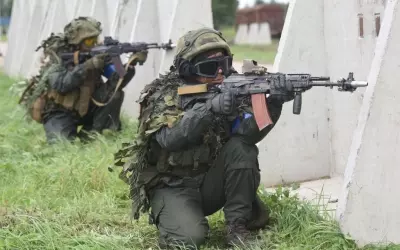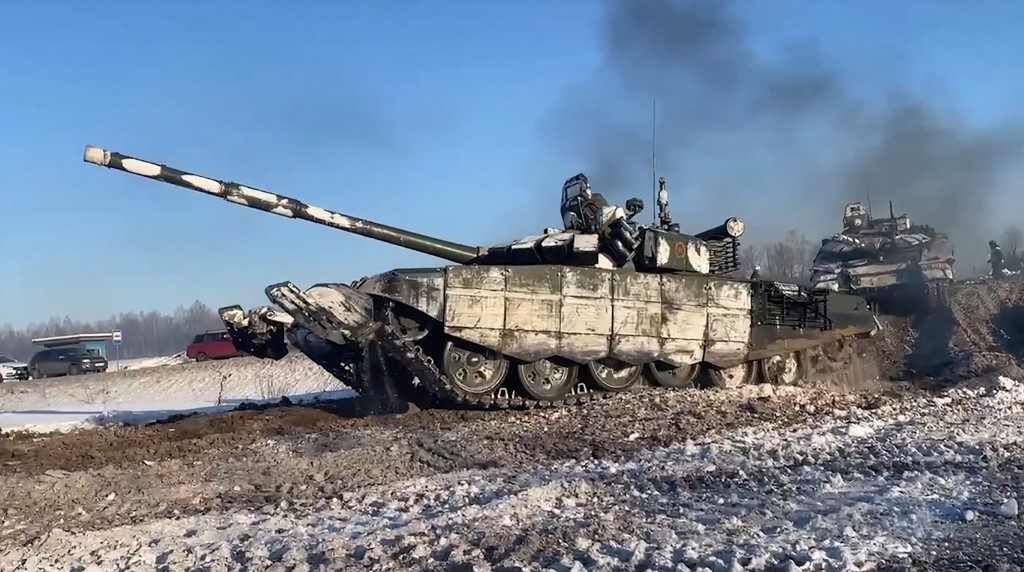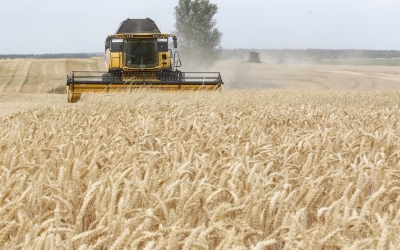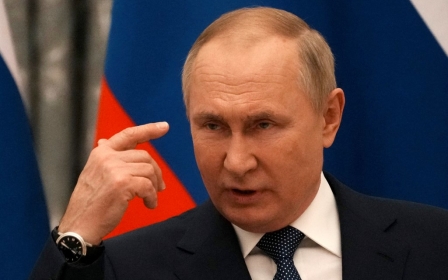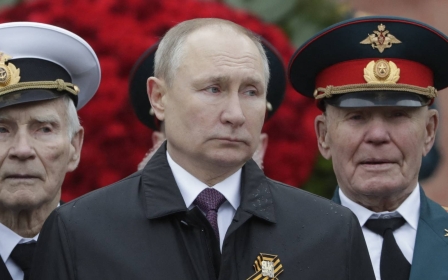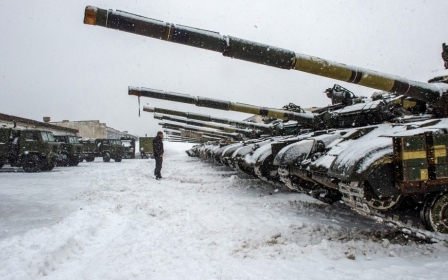Ukraine crisis: Why Putin is negotiating with the West at the barrel of a gun
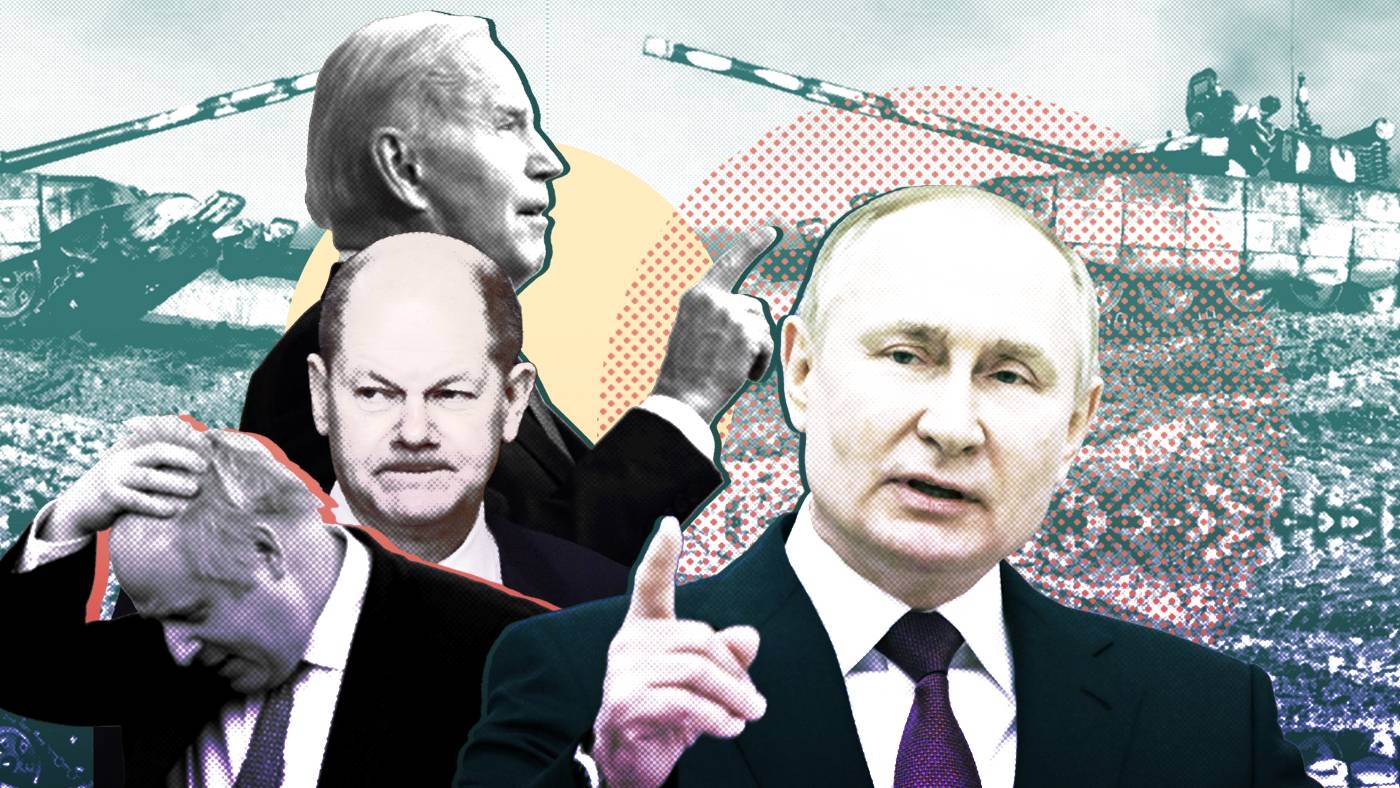
The Ukraine crisis has been scripted in Hollywood many times, but most successfully in the Star Wars franchise.
The Darth Vader of this drama is an insecure man. He keeps his guests waiting, sometimes by four hours or more. He wears concealed shoe wedges to advance his natural height (around 5’6”). Like many other 69-year-olds, Russian President Vladimir Putin has back problems, and yet he loves posing as the action man in various guises - a scuba diver, a jet pilot, a horseman.
The relationship between the Russians and the Ukrainians is just as entangled, and has as long a history, as that between the English and the Scots
He is short-sighted, at one point confusing a former Times journalist with the former head of MI6, who was around the same dinner table at the Valdai Discussion Club (as was I). He has said Ukraine does not exist and dismisses independence-seekers as Nazi-era fascists.
Up against the Death Star, the plucky Luke Skywalkers of this world are hopelessly outnumbered and outgunned. The force (Nato) is with this nation of Jedis, but keeps a safe distance. They are fighting for a country free from Russian domination.
To sustain this narrative that the conflict in Ukraine can be boiled down to the perennial fight between eastern autocracy and western democracy, you too must join an army of myth-makers. The relationship between the Russians and the Ukrainians is just as entangled, and has as long a history, as that between the English and the Scots.
New MEE newsletter: Jerusalem Dispatch
Sign up to get the latest insights and analysis on Israel-Palestine, alongside Turkey Unpacked and other MEE newsletters
Unionists and nationalists
A major part of the British establishment is unionist, which is why it is such an irony that Defence Secretary Ben Wallace, a former captain in the Scots Guards, recently presented his Russian counterpart, Sergei Shoigu, with a sword from the time of George VI, “when the Soviet Union and Britain fought side-by-side against the Nazis”.
Wallace is a Tory unionist who would not take kindly to Scottish nationalism, even though decades of Tory rule from Westminster, topped by Brexit, have naturally forged a majority for independence in Scotland. On Ukraine, Wallace is on the side of the nationalists, not the unionists.
Is it so unusual for the UK to rush to the defence of ethnic Britons in foreign lands? What was Northern Ireland all about? To this day, the British government sticks to the formula that Northern Ireland belongs to the British Crown, as long as the majority in the six counties want to keep it that way.
And yet, in Ukraine, Ukrainians who do not recognise the post-Maidan government in Kyiv are seen by Britain as separatists, which is historically how Stormont was regarded by Dublin. Peace came at last while rival claims of sovereignty were shelved, and a power-sharing agreement was set up between nationalists and unionists in Stormont. The last thing either side wants in Britain’s dispute with the EU is for the border at Crossmaglen to rise, phoenix-like, from the ashes.
This is not a million miles from the Minsk agreement signed in 2015, which called for the withdrawal of foreign troops and mercenaries in Eastern Ukraine (in Northern Ireland terms, “deconfliction and decommissioning”), as well as constitutional reforms in Ukraine that would provide for decentralisation.
It was signed by Putin for Russia, Francois Hollande for France, Angela Merkel for Germany and Petro Poroshenko for Ukraine, but never enacted. “From my point of view, the Minsk agreements were born dead,” the Guardian quoted Volodymyr Ariev, an MP from Poroshenko’s party, as saying. “The conditions were always impossible to implement. We understood it clearly at the time, but we signed it to buy time for Ukraine: to have time to restore our government, our army, intelligence and security system.”
A 'loony fable'
So who walked away from Minsk? And what happened in the Falklands War or Gibraltar? In each, Britain maintained it had a duty to protect ethnic Britons whose identity was threatened by nations on whose land they had staked their outpost.
How then does that right, exercised by Britain in Gibraltar’s case for hundreds of years, evaporate when similar action is taken by Russia to safeguard the rights of millions of ethnic Russians living beyond its borders? The population of the Falkands at the time of the war in 1982 was 1,820 people and 400,000 sheep.
There are other indicators that all is not quite what it seems in Ukraine. Putin’s view that the Russians and Ukrainians are one people, and that Ukraine is not a separate country, is attributable to his KGB origins. After all, he did call the collapse of the Soviet Union the greatest geopolitical disaster of the 20th century.
And yet, Putin is not alone in expressing these views, which are shared by Russians who were suppressed by the Soviets - most particularly in the Russian Orthodox Church, for whom Kyiv is historically the mother church.
And here lies another conveniently shelved fact: when Aleksandr Solzhenitsyn, at the time the greatest living chronicler of the Soviet Gulag system, returned to his native land, he turned out to be a Russian nationalist with identical views about the non-existence of Ukraine. He launched a fierce tirade against former US President George W Bush for falling for what he called a “loony fable” over Ukrainian history.
One of the wellsprings of Ukrainian nationalism was the Holodomor, a 1932-33 famine in which millions died of starvation under Stalin. Solzhenitsyn, the top historian of Soviet repression, said that the famine had “mown down” millions across the Soviet Union, and that many of the communists who orchestrated it were in fact Ukrainian.
“This provocative outcry about genocide … has been elevated to the top government level in contemporary Ukraine. Does this mean that they have even outdone the Bolshevik propaganda mongers with their rakish juggling?” Solzhenitsyn asked.
In fact, he and Putin became pals. Putin allowed the greatest Soviet dissident to settle in a dacha outside Moscow and gave him an award to recognise his literary achievements. It turns out that Russian nationalism is stronger than the Soviet revanchism ascribed to Putin.
Delicate patchwork
Putin’s dispute with the West over Ukraine goes back at least three decades, to the 1990s, when I was a correspondent in Moscow and travelled to all parts of Ukraine. At the time, Boris Yeltsin’s Russia had turned its back on Ukraine, as indeed it had on most of its backyard. It was more interested in its relationships with the US and Germany.
For its part, the Ukraine I knew was a delicate patchwork. The east was Russian-speaking and largely, but by no means wholly, pro-Russian. The pro-Russian feeling in the Donbas region was different in intensity to public opinion in Kharkiv in the northeast.
This is a conscious decision to rewrite the history of modern Ukraine as a continuous struggle against Russian domination
The pro-Russians frequently expressed bemusement about the existence of a border between Moscow and Kyiv. In Kyiv itself, it was not uncommon for families to straddle the linguistic divide between Russian and Ukrainian. This peace held while bushfire wars ignited throughout the former Soviet Union: in Georgia, Transnistria, Abkhazia, Nagorno-Karabakh, and most notably Chechnya.
The city of Lviv in western Ukraine - where the Ukrainian Greek Catholic Church, not Orthodox, is predominant - was different. My grandfather, a Polish Jew, was born there. It was not called Lviv then, but Lemberg, and it was part of Galicia, the easternmost province of the Austro-Hungarian empire.
The city had a ferociously bloody history, even by the standards of Eastern Europe. It was contested by Ukrainians, Poles, Polish Lithuanians, Bolsheviks and Germans. Before the war, it had the third-largest Jewish population in Poland. Simon Wiesenthal, the Nazi hunter, was one of them.
When the Nazis invaded the Soviet Union in 1941, they were greeted by the Ukrainians of Lviv as liberators after two years of brutal Soviet rule. While Stalin’s Red Army retreated, the NKVD executed thousands of prisoners, a slaughter that was repeated in Minsk.
Atrocities and revisionism
On the first day of Nazi occupation in Lviv, one of the wings of the Organisation of Ukrainian Nationalists (OUN) declared a restoration of an independent Ukrainian state.
Around 6,000 Jews were killed in two pogroms from June to July of 1941. The “Lwow Ghetto” was established to house 120,000 Jews, many of whom were exported to the Belzec concentration camp. Between that and the Janowska camp, the city’s Jewish population was annihilated.
A former British military liaison officer told me that when the death camps were liberated in that area, they were astonished to find the bodyguards were Ukrainian.
The part played by Lvivians in these atrocities is hotly debated, and much revisionism has taken place. Some of the killings were attributed to gangs of Ukrainian nationalists, but Jews were also hidden by Lvivians from their hunters.
Whatever the truth, to elevate the two leaders of that era - Stepan Bandera from the OUN and Roman Shukhevych from the Ukrainian Insurgent Army (UPA) - to the status of national heroes, as the Ukrainian nationalist movement has done, must count as one of the major modern acts of Holocaust denial. Tens of thousands of Poles and Jews died at the hands of these groups.
To say, as Maidan’s apologists do, that Ukraine has a president who is Jewish, does not wash. This is a conscious decision to rewrite the history of modern Ukraine as a continuous struggle against Russian domination.
Many other acts have deepened the conflict among Ukrainians, including the 2018 decision to separate the churches of Kyiv and Moscow - marking the biggest split in Orthodox Christianity in a millennium. The move was justified by Russia’s annexation of Crimea several years earlier, and accusations that the Russian Orthodox Church had allowed itself to be used as a tool of Russian expansionism.
Another big moment was a 2015 law that made it mandatory for public sector workers to speak Ukrainian, despite Russian being the predominant language in much of the east.
Cause and effect
Whatever happens now, Putin’s Russia has lost Ukraine. The threat of invasion alone has likely pushed most Ukrainians to support the country’s application to Nato.
If, as I suspect to be the case, all Putin currently wants is to force the US and Europe to negotiate a new security pact - Putin likes clean and quick wars as much as the US does, and a Russian invasion would be neither - then he is carrying out negotiations at the barrel of the gun.
After decades of being ignored by successive US presidents, there is such a thing in international relations as cause and effect. One curious feature of the military buildup on both sides of the border is that each side is going out of its way to show the other what they have got. Putin is making no attempt to conceal missile launchers, which is not what you would normally do to such vulnerable assets.
The Americans are highlighting weapons transfers to the government in Kyiv via social media, releasing photos of planeloads of weapons and equipment. The US has also sent Stinger missiles, threatening to make the Russian military presence in Ukraine another Afghanistan.
— U.S. Embassy Kyiv (@USEmbassyKyiv) January 22, 2022
This does not strike me as typical prewar behaviour. Putin is not a risk-taker. He makes extraordinary efforts to condition the environment in which he acts. Attacking built-up areas with tanks is fraught with risk, and I don’t think Putin would make that choice.
But if I am wrong, and the tanks do indeed roll into Ukraine, ask yourself whether this situation was inevitable, and whether indeed it is black and white. Was Nato’s eastern expansion wise, if all it has done is move the line of confrontation eastwards? Did it cement democracy or provoke civil war?
Should the West have ignored repeated warnings from Putin about legitimate Russian concerns, which he expressed from the Munich conference of 2007 onwards? Should Bush have torn up a treaty with Russia in order to advance missile defence in Poland? Could Ukraine have escaped being ravaged by the competing forces of Russian and Ukrainian nationalism, and emerged masters of their own land? War and separatism were absolutely not inevitable.
Once, the economies of Ukraine and Poland were roughly on a par with each other. Now the GDP of Poland is significantly greater than that of Ukraine. Has Ukraine’s entry into the western camp enriched the lives of Ukrainians?
One way out of this slow-motion car crash, and the only sensible thing that has been said by anyone, was the suggestion by Ukraine’s ambassador to Britain that his country could drop its bid to join Nato. He rapidly had to walk back that idea.
Better not to go off script; it’s the only thing anyone seems to understand.
The views expressed in this article belong to the author and do not necessarily reflect the editorial policy of Middle East Eye.
Middle East Eye delivers independent and unrivalled coverage and analysis of the Middle East, North Africa and beyond. To learn more about republishing this content and the associated fees, please fill out this form. More about MEE can be found here.



